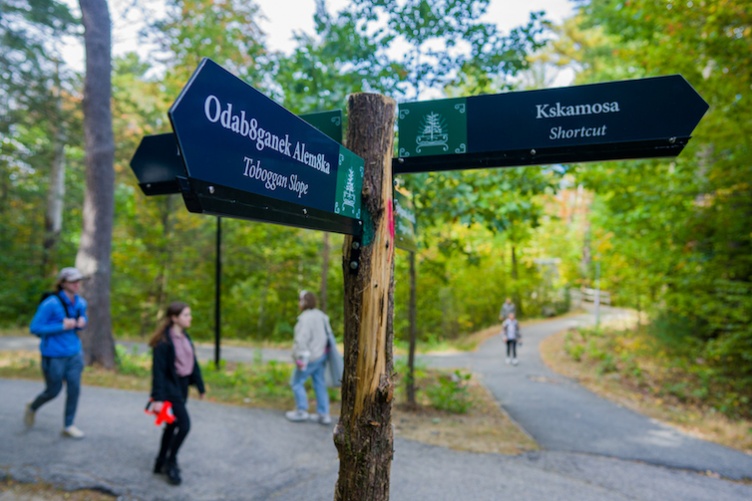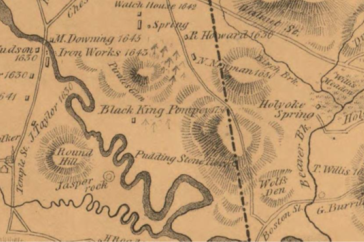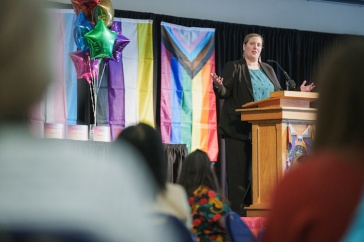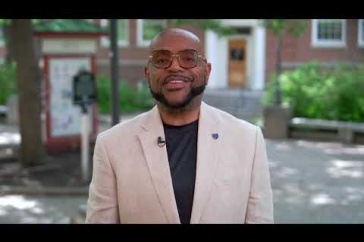
Members of the Indigenous New Hampshire Collaborative Collective (INHCC) – including several from the UNH community – were prepared to make a hard sell to UNH campus architects and planners when they first pitched the idea of naming a series of trails and bridges on campus to honor Abenaki culture and history.
Turns out they barely needed a pitch at all.
“We had prepared this whole presentation thinking we’d have to convince them, and they cut us off after the second slide and said, ‘We love this,’” says Alexandra Martin, faculty fellow in anthropology, coordinator of UNH’s Native American and Indigenous studies minor and a member of the INHCC.
That meeting was in 2019, and a project that has since been met with similar enthusiasm every step of the way officially came to fruition in late September 2022 with the installation of signage. A series of four trails and five bridges in the College Brook Ravine area located behind Hamilton Smith Hall and Dimond Library have been named following traditional Abenaki naming conventions to honor the Indigenous people who first occupied the land on which UNH stands.

The trails are frequently trafficked but were previously unnamed, unlike most other parts of campus, which have received monikers to honor important figures.
“Naming is such an important part of places at UNH. So many buildings and streets and even benches have been named after people,” Martin says. “We thought why not bring some recognition to the original inhabitants of this landscape and honor them, not as financial donors but as stewards of the land.”
The project began as a collaboration between the INHCC and the Cowasuck Band of the Pennacook-Abenaki People and received support from a wide range of departments across campus. Funding and support for the endeavor were provided by the American Council for Learned Societies, the UNH Office of Community, Equity, and Diversity, the UNH President’s Fund, the UNH Provost’s Fund, the UNH Office of Stewardship and a donation from the Coe-Hall Memorial Fund.
“This project provides an opportunity to pause and reflect and learn. It is a means for awareness building and a permanent reminder of the Abenaki, past and present, that called the land on which UNH sits home,” says Nadine Petty, associate vice president for diversity, equity and inclusion and chief diversity officer at UNH. “It centers the Indigenous experience, both in language and in history – it is the very act of ‘centering’ an underrepresented people that makes this project profound and worthy of celebration, and I think it will contribute to the more inclusive campus community we strive toward.”
The trails were selected for the project because they feature several significant landscape features that are important to the Abenaki people, past and present – waterways are revered in tribal cultures, so the brook was a natural draw, as were the surrounding wetlands (referred to as medicine gardens in Abenaki culture).
The Cowasuck Band of the Penacook Abenaki People played a critical role in helping select names for the project, led by Denise and Paul Pouliot, head female and male speaker of the band, respectively – both of whom were instrumental alongside Martin in the creation of the Native American and Indigenous studies minor that was established in 2019.
The trails were named Gweni Wsk8wdik (Long Trail), Kskamosa (Shortcut), Ksakameniganek (Short Portage) and Odab8ganek Alem8ka (Toboggan Slope). The bridges were named Skaw8kok (Lookout), Oskanahlagw (Bone Metal), Abaziiya 8wdisizek (Wooden Path), Nanamebaga (Rippling Water) and Seniga Bedegw8gihla (Stone Arch).
"It is the very act of ‘centering’ an underrepresented people that makes this project profound and worthy of celebration, and I think it will contribute to the more inclusive campus community we strive toward."
Abenaki naming conventions often feature physical descriptions, Paul Pouliot says, so many of the names include references to construction material. Bone Metal, for instance, is an Abenaki phrase for steel.
“It all lends itself to student engagement,” Paul Pouliot says.
“We’re hoping it’s a great beginning to a longer-term relationship.” Denise Pouliot adds, noting that an Indigenous garden is slated to be installed on campus this spring, as well. “I think it’s great that the students will get to have that cross-cultural experience.”
The students involved in the process thus far have agreed with that sentiment, embracing the project. Nicholas Fitzgerald ’21 was a vocal supporter during his time as undergraduate student body president, and Troy Troy ’24, campus structure chair, has shared similar excitement since first joining discussions this summer.
“I think it’s really important to not only be able to honor the culture of the people who have lived here in the past and are still here, but it’s also a way to inform others about the Abenaki people,” Troy says. “The history of this land is just as much our history as it is of the colonizers, and I am really glad efforts are being put in place to start to teach people about it.”
Beyond creating a way to honor an Indigenous culture, naming the pathways will also have public safety and wayfinding benefits for the UNH community, as the names provide a definitive way to describe one’s location within the area, which proved challenging when the trails were unnamed.
Each trail or bridge name is represented on a signpost – created using cedar extracted from nearby College Woods – featuring both the Abenaki name and the English translation. There will also be a QR code to scan, which will take visitors to a website featuring historical information as well as audio clips of the traditional Abenaki pronunciations.
When the signposts went in the ground in late September, it represented the culmination of more than three years of hard work by people in numerous departments across campus. Martin was thrilled to see so many UNH community members rally together to honor a different community that first walked the land so long ago.
“It’s really great to see when everyone is working toward a common goal that we all feel excited about, we really can make it happen,” Martin says.
-
Written By:
Keith Testa | UNH Marketing | keith.testa@unh.edu

















































